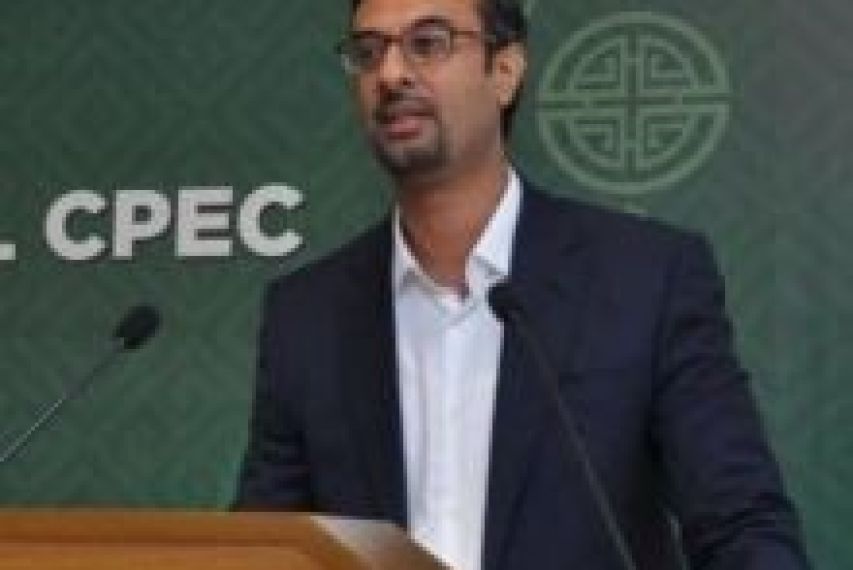UVA Global Podcast: Interview with Tayyab Safdar
UVA Global Podcast: Interview with Tayyab Safdar

Emily Mellen 0:04
Welcome to the second episode of our new podcast series. I'm Emily Mellen and I’m here with Tayyab Safdar, a postdoctoral researcher at UVA’s East Asia center. His current research explores the emerging dynamics of South-South development cooperation, especially after the launch of China's Belt and Road Initiative, BRI, in 2013. Welcome Tayyab, thank you for talking with me today. Can you tell us a little bit about your current project, the Assessment of China's Belt and Road Initiative?
Tayyab Safdar 0:31
Thank you very much, Emily, thank you for inviting me. So, the Assessment of China's Belt and Road Initiative project began in earnest at UVA around 2019. I joined in 2020. And the idea behind the project is to take an interdisciplinary sort of an approach, a better insight into the multifaceted interaction of China with countries across the developing world. We have a number of different sort of thematic areas within which people are members, and then they undertake research and they can also develop broader linkages with researchers in other parts of the world.
Emily Mellen 1:16
Can you tell me a little bit about your research, particularly?
Tayyab Safdar 1:20
Yeah, so my research looks at, of course, the South-South cooperation. So, basically, the concept of South-South cooperation is that developing countries come together. And over the course of the last two decades, we've seen these emerging actors in the Global South gain greater economic importance. So, actors like China, other countries like India, Brazil, Russia, etc. So, my research looks at how this sort of South-South cooperation takes place. As developing countries like China become more important, the question becomes whether the sort of relationship is as asymmetric as it was (a) and, secondly, whether the way in which this cooperation sort of takes place, whether it is different, as compared to these sort of asymmetric power relationships between the North and the South.
Emily Mellen 2:19
You mentioned that you focus on Pakistan, in part because that's also where you're from. So, tell me a little bit more, how did you get interested in these issues in particular and the relationship with China?
Tayyab Safdar 2:30
My PhD research was actually different, a little different, but I was always interested in these issues of globalization and on the global economic system. So, my research sort of explored how globalization of production in agricultural value chains, how that sort of plays out at the local level within. So, when China launched the Belt and Road Initiative in 2013, this was one of those areas where I had enough, as I said, you know, a previous sort of interest as well. So. I wanted to understand how these dynamics sort of play out in terms of a different actor that’s sort of leading globalization in many ways. And again, whether, you know, how it interacts with local power structures.
Emily Mellen 3:18
I can see that relationship and how that would have developed. So, talking a little bit more about the bigger project, the BRI evaluation, how is the CGII funding helping your project or what does that look like, the relationship?
Tayyab Safdar 3:34
So, CGII funding has been invaluable. We would not have been able to do a lot of the activities that we wanted to do. For one, we are organizing, as I said, you know, one of the things that we're trying to do is to establish relationships, not only within the university, between different disciplines, but also trying to expand and work with universities in other parts of the world as well. So, one of the ways that we’re doing this is by organizing conferences and workshops looking at different sorts of issues. These sort of opportunities or theese sort of cross-regional sort of forms of knowledge sharing would not have been possible without CGII’s support. And then we've got this large bibliography project as well. The bibliography project is really important, because this is perhaps one of those few you know sort of projects where there is a systematic collection of the body of literature that's been created on the BRI.
Emily Mellen 4:41
I appreciate that diversity of approaches. That's exactly the kind of global collaboration and research that we love to support. I see that you finished your PhD at Cambridge in the UK. What brought you to UVA, can you tell us a little bit about that story?
Tayyab Safdar 4:58
My wife brought me to UVA. My wife joined Economics as an assistant professor. And I came here and I came across the BRI project over here and I got in touch with Dorothy Wong, who is, of course, the director of the East Asia Center. And with the wonderful BRI project over here, things sort of clicked. I joined over here. But yeah, basically my wife.
Emily Mellen 5:33
Good. Well, thank you so much for talking with me today. I really appreciate it. And we enjoy hearing more about your new endeavors.
Tayyab Safdar 5:41
Thank you very much. Thank you for inviting me.
Transcribed by https://otter.ai



